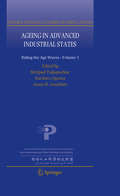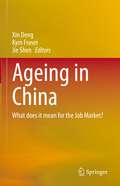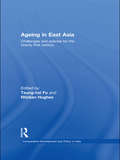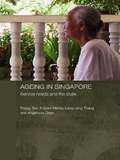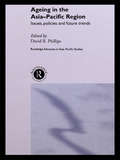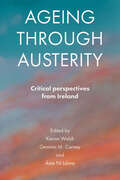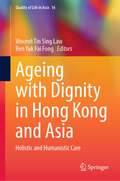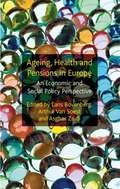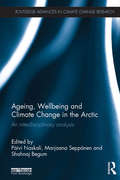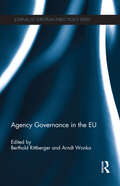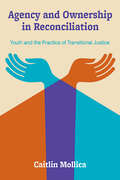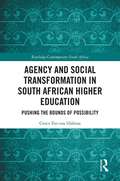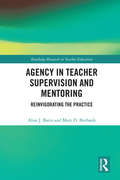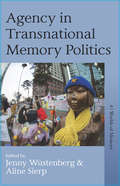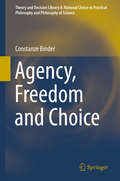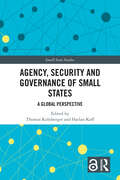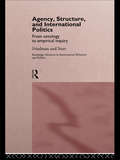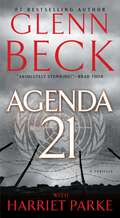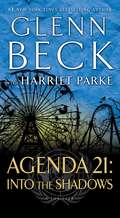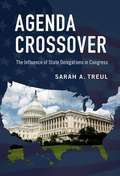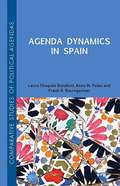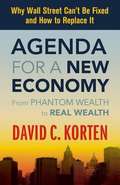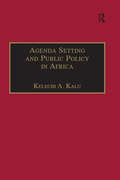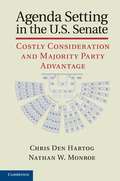- Table View
- List View
Ageing in Advanced Industrial States: Riding the Age Waves - Volume 3 (International Studies in Population #8)
by Naohiro Ogawa Anne H. Gauthier Shripad TuljapurkarPopulation growth slowed across the world in the last decades of the 20th century, changing substantially our view of the future. The 21st century is likely to see the end to world population growth and become the century of population aging, marked by low fertility and ever-increasing life expectancy. These trends have prompted many to predict a gloomy future caused by an unprecedented economic burden of population aging. In response, industrialized nations will need to implement effective social and economic policies and programs. This is the final volume in a series of three. The papers included explore many examples and strengthen the basis for effective economic and social policies by investigating the economic, social, and demographic consequences of the transformations in the structures of population and family. These consequences include changes in economic behavior, both in labor and financial markets, and with regard to saving and consumption, and intergenerational transfers of money and care.
Ageing in China: What does it mean for the Job Market?
by Jie Shen Kym Fraser Xin DengThis book provides a comprehensive examination of the effect of ageing population in China on labour market. The delay in releasing 2020 census data in China once again drew world’s attention to the ageing population in China: the births have fallen to their lowest level since the 1960s. The relaxation of one-child child policy seems to have little impact to reverse the declining birth rate starting in the 2010s. Rising longevity have made China - the most populous country in the world- fast becoming an ageing society. Within a few decades, it will become the country with the largest ageing population in the world. This book adopts a multi-disciplinary approach to explore the effects of ageing population on labour market at three levels: Macro, organizational and individual levels. Population ageing in China is of interest to researchers, practitioners and policy makers across the world. Population ageing has profound effects on various parts of the society, and this book will focus on the labour market, aiming at producing a comprehensive picture of how population ageing affecting the composition of workforce and the way people work from the perspective of individuals, organization and society as a whole. This book examines China’s population ageing through the lens of economics, management and sociology, in order to produce a comprehensive understanding of this issue. This book includes cutting-edge research and most up-to-date statistics for arguably China’s most important social change for the next few decades. This book encases high quality research on China’s ageing population and is expected to the reliable source of information for future research and policy development. This book presents a collection of chapters examining the impact of population ageing at three levels in order to provide a holistic view of this matter and allow readers to choose the topic that meet their interests.
Ageing in East Asia: Challenges and Policies for the Twenty-First Century (Comparative Development and Policy in Asia)
by Rhidian Hughes Tsung-Hsi FuAgeing populations present considerable challenges to welfare states internationally, and East Asia is no exception. Demographics show that countries in East Asia either have the highest proportion of older people, or the speed at which their population is ageing is faster than anywhere else in the world. This book explores the causes and trends of population ageing in eight countries, and discusses the challenges and impacts of population ageing on public policies. East Asian countries have developed new policies to meet older people’s needs – across health, social care, income maintenance, employment and housing. Ageing in East Asia provides the first comprehensive introduction to ageing policies in East Asian countries. The book: explores causes and trends of population ageing discusses the challenges and impacts of population ageing on public policies examines the important strategic and theoretical policy contexts of ageing policies in East Asian countries covers eight East Asian countries in dedicated chapters: examining Japan, China, South Korea, Taiwan, Hong Kong, Singapore, Malaysia and Thailand. This volume brings East Asian countries clearly into focus, and illuminates the state of welfare development internationally. It provides an important resource for lecturers, students, researchers and policy makers with interest in East Asia, older people and welfare policy.
Ageing in Singapore: Service needs and the state (Routledge Contemporary Southeast Asia Series #Vol. 10)
by Leng Leng Thang Kalyani Mehta Angelique Chan Peggy TeoOlder persons are often portrayed as social and financial burdens because pensions, health and social care have to withstand increasing old age dependency ratios. Due to a lack of access to representation or a lack of social and economic power, older people have found few opportunities to have their voices heard, making age an immensely political issue. Written by an impressive team of authors, this book provides an in-depth analysis of the experience of ageing in Singapore examining key issues such as health, work, housing, family ties and care giving. It looks at how social categorization enters into everyday life to elucidate the multiple meanings of age and identity encountered in a rapidly changing economy and society. Providing original critical discourse from Asian writers recording Asian voices, Ageing in Singapore will appeal to a wide readership and is an invaluable resource for policy makers, service practitioners and scholars working on Asian gerontology.
Ageing in the Asia-Pacific Region: Issues, Policies and Future Trends (Routledge Advances in Asia-Pacific Studies)
by David R. PhillipsFirst Published in 2004. Routledge is an imprint of Taylor & Francis, an informa company.
Ageing through Austerity: Critical Perspectives from Ireland
by Edited by Kieran Walsh, Gemma M. Carney and Áine Ní LéimeDemographic ageing is identified as a global challenge with significant social policy implications. This book explores these implications, with a particular focus on the pressures and prospects for ageing societies in the context of austerity. The book presents a carefully crafted study of ageing in Ireland, one of the countries hardest hit by the Eurozone financial crisis. Providing a close, critical analysis of ageing and social policy that draws directly on the perspectives of older people, the text makes significant advances in framing alternatives to austerity-driven government policy and neoliberalism, giving a refreshing interdisciplinary account of contemporary ageing.
Ageing with Dignity in Hong Kong and Asia: Holistic and Humanistic Care (Quality of Life in Asia #16)
by Ben Yuk Fai Fong Vincent Tin Sing LawThis book advocates the application of holistic and humanistic approaches in elderly care and services to achieve the goal of ageing with dignity in Hong Kong and Asia. It responds to the needs of an increasing ageing population that has to deal with related health needs in long-term care, community health and social services, particularly for chronic conditions and psychosocial support. The book consists of three sections on policy and development of aged care, holistic and humanistic care for older adults, and capacity building for ageing with dignity, respectively. Topics include the latest initiatives in aged care, appropriate services and delivery models, lifestyle modification, psychosocial and environmental considerations, professional development, technologies, and social capital. The chapters review and discuss these issues within a global context, illustrated by examples from Asian countries, underpinned by locally based empirical research. Contributors include academics and practitioners from diversified professional backgrounds that include medicine, nursing, pharmacy, traditional Chinese medicine, dietetics, and allied health. The book traverses into territories in the social sciences, life sciences, and sports sciences, while also touching on areas of business and administration, hospitality, law, public policy, and information technology in connection with public health. The contents serve as a topical reference for tertiary studies in ageing and related disciplines such as well-being and are also useful to policymakers, community and public health practitioners, health executives and interns working in areas of policy and practice pertinent to care development, health delivery models, planning, quality, ethics, better health promotion, professional training, and monitoring for older adults.
Ageing, Health and Pensions in Europe
by Lans BovenbergProviding an overview of the future research challenges for economists and social scientists concerning population ageing, pensions, health and social care in Europe, this book examines how scientific research can provide cutting-edge evidence on income security and well-being of the elderly, and labour markets and older workers.
Ageing, Wellbeing and Climate Change in the Arctic: An interdisciplinary analysis (Routledge Advances in Climate Change Research)
by Shahnaj Begum Marjaana Seppänen Paivi NaskaliThe Arctic and its unique natural resources have become objects of increasing concern. Rapid climate change and ageing of the population are transforming the living conditions in the region. This translates into an urgent need for information that will contribute to a better understanding of these issues. Ageing, Wellbeing and Climate Change in the Arctic addresses the important intersection of ageing, wellbeing and climate change in the Arctic region, making a key interdisciplinary contribution to an area of research on which little has been written, and limited sources of information are currently available. The book explores three key areas of discussion. First, various political issues that are currently affecting the Arctic, such as the social categorisation of elderly people. Second, the living conditions of the elderly in relation to Arctic climate change. Third, the wellbeing of elderly people in terms of traditional knowledge and lifestyles. The book also features contributions from a number of key researchers in the field which examine a broad range of case studies, including the impact of climate change on health in Lapland and elderly people and geographical mobility in Norway. This book will be of great interest to scholars of climate change, gerontology and social policy.
Agency Governance in the EU (ISSN)
by Berthold Rittberger and Arndt WonkaThe rapid proliferation of EU agencies represents one of the most significant changes to the EU’s organisational set-up in past decades. At the same time, this development has significantly affected regulatory policy-making in the EU.This volume assembles the most renowned scholars in the field to address the key themes and challenges that agency governance in the EU poses to effective and legitimate policy-making. The first theme addresses the causes and dynamics of the creation and design of regulatory bodies in EU governance, focusing not only on EU agencies but also on alternatives to the agency format, such as regulatory networks. Second, once agencies are established, the book goes on to explore the consequences and trajectories of agency governance. How effective and autonomous are EU agencies? How does EU agency governance transform existing patterns of executive governance in the EU? Third, the book addresses the design of EU agencies as independent, non-majoritarian institutions poses pressing questions with a view to their legitimacy and accountability.The volume appeals to scholars and practitioners interested in the development and transformation of executive governance in the EU.This book was published as a special issue of the Journal of European Public Policy.
Agency and Ownership in Reconciliation: Youth and the Practice of Transitional Justice
by Caitlin MollicaThe importance of youth's substantive participation for the realization of inclusive reconciliation practices has rarely been acknowledged. Agency and Ownership in Reconciliation provides a comprehensive, nuanced, and empirical account of the contribution of young people's voices to the success of transitional justice and peacebuilding practices. Caitlin Mollica illustrates the role of political will and agency in the development of transitional justice mechanisms that are substantively inclusive of those traditionally marginalized by post-conflict institutions, most notably youth. In doing so, she highlights the importance of youth to lasting peace and meaningful justice. She does so by looking specifically at how truth and reconciliation commissions from South Africa to the Solomon Islands engage with the voices of youth and the meanings youth self-ascribe to their experiences during truth and reconciliation commission processes. In a field which traditionally prioritizes stories about youth, Agency and Ownership in Reconciliation looks to center stories by youth.
Agency and Social Transformation in South African Higher Education: Pushing the Bounds of Possibility (Routledge Contemporary South Africa)
by Grace Ese-osa IdahosaThis book explores the process of transformation, discussing how individuals are capable of acting to enable transformation of structures and cultures through the lens of South African higher education. Agency and Social Transformation in South African Higher Education examines the role of agency in effecting change amidst the rigid conditions within South African universities. Arguing for a focus on transformation from below, it explores transformation and agency from the perspective of academic staff. Through discussing moments at which faculty members embedded in rigid structures and cultures perceive themselves as having had the agency to interrupt and transform them, despite their rigidity, this book describes the nuances of social action and agency within the South African higher education institutional context and the ways in which contextual histories may provide enabling/limiting conditions to individuals within them. This book makes an important contribution to the field of agency and social transformation theoretically, methodologically and geographically as it details the motivations for transformation, how individuals become agents of change and the practical experiences of these individuals from a localised perspective. Agency and Social Transformation in South African Higher Education will be of interest to scholars and students of African higher education, transformation studies and postcolonial studies.
Agency in Teacher Supervision and Mentoring: Reinvigorating the Practice (Routledge Research in Teacher Education)
by Alisa Bates Mary D. BurbankOffering an in-depth examination of field supervision and the role of the university supervisors in preparing teachers, this book addresses the challenges of providing novice teachers with quality supervision through the support and guidance of teacher education programs. Through a research-based lens, Bates and Burbank discuss the role, responsibilities, and opportunities of the university supervisor. Critically examining the supervisor as an agent of change who is positioned to empower early career teachers, the authors dissect the necessary preparation and support new teachers need in contemporary K-12 classrooms.
Agency in Transnational Memory Politics (Worlds of Memory #4)
by Jenny Wüstenberg and Aline SierpThe dynamics of transnational memory play a central role in modern politics, from postsocialist efforts at transitional justice to the global legacies of colonialism. Yet, the relatively young subfield of transnational memory studies remains underdeveloped and fractured across numerous disciplines, even as nascent, boundary-crossing theories on topics such as multi-vocal, traveling, or entangled remembrance suggest new ways of negotiating difficult political questions. This volume brings together theoretical and practical considerations to provide transnational memory scholars with an interdisciplinary investigation into agency—the “who” and the “how” of cross-border commemoration that motivates activists and fascinates observers.
Agency in Transnational Memory Politics (Worlds of Memory #4)
by Jenny Wüstenberg and Aline SierpThe dynamics of transnational memory play a central role in modern politics, from postsocialist efforts at transitional justice to the global legacies of colonialism. Yet, the relatively young subfield of transnational memory studies remains underdeveloped and fractured across numerous disciplines, even as nascent, boundary-crossing theories on topics such as multi-vocal, traveling, or entangled remembrance suggest new ways of negotiating difficult political questions. This volume brings together theoretical and practical considerations to provide transnational memory scholars with an interdisciplinary investigation into agency—the “who” and the “how” of cross-border commemoration that motivates activists and fascinates observers.
Agency, Freedom and Choice (Theory and Decision Library A: #53)
by Constanze BinderIn this book, Binder shows that at the heart of the most prominent arguments in favour of value-neutral approaches to overall freedom lies the value freedom has for human agency and development. Far from leading to the adoption of a value-neutral approach, however, ascribing importance to freedom’s agency value requires one to adopt a refined value-based approach. Binder employs an axiomatic framework in order to develop such an approach. She shows that a focus on freedom’s agency value has far reaching consequences for existing results in the freedom ranking literature: it requires one to move beyond a person’s given all-things-considered preferences to the values underlying a person’s preference formation. Furthermore, it requires, as Binder argues, one to account (only) for those differences between choice options which really matter to people. Binder illustrates the implications of her analysis for the evaluation of public policy and human development with the capability approach: only if sufficient importance is ascribed to freedom’s agency value can the capability approach keep its promises.
Agency, Security and Governance of Small States: A Global Perspective (Small State Studies)
by Thomas Kolnberger Harlan KoffAgency, Security and Governance of Small States examines what seems to be a defining paradox of Small-State Studies: the simultaneous coexistence (and possible co-dependence) of vulnerability and opportunity related to small-state size. This book analyses small states within the framework of this apparent paradox. Traditionally, Small-State Studies has focused on three guiding questions: what constitutes a ‘small state’? What explains small-state influence in global affairs? Are small states truly vulnerable to security threats given the expansion of multilateralism and regionalism throughout the world? This book contends that new questions should be asked which recognise the important shifts in twenty-first century security paradigms, to better understand how some states deploy their smallness as a resource for agency in supranational contexts. By varying historical, geographical, security, and governance contexts, the book embraces a most-different-cases approach. The historical perspective is often neglected in Small-State Studies but contributes to understanding how small states have often, over time, transformed perceived insecurity into agency. By focusing on different world regions, the authors enable the comparative analysis of collective actions, and the creation and implementation of institutions for ‘common sense purposes’ within a geographical region. Of particular contemporary importance, the book includes contributions which contend with hard-security issues alongside other soft-security challenges. The comparison of case studies confirms that hard-security vulnerability and soft-security opportunities seem to be two sides of the same coin, which reinforces the book’s focus on small-state paradoxes, and raises the question of whether smallness can be considered the defining characteristic of governance in these countries. This book will have a broad appeal because of the different world regions it analyses. It will be of interest to postgraduate students, scholars, and researchers of international relations, security, sustainability, governance, development, and political economy, as well as Small-State Studies. The Chapters 4, 8 and 11 of this book are freely available as downloadable Open Access PDFs at http://www.taylorfrancis.com under a Creative Commons Attribution-Non Commercial-No Derivatives (CC-BY-NC-ND) 4.0 license. The publication of Chapter 4 as Open Access has been made possible by the Institute of History at the University of Luxembourg. The publication of Chapter 8 as Open Access has been made possible by Western Sydney University. The publication of Chapter 11 as Open Access has been made possible by the University of Hamburg.
Agency, Structure and International Politics: From Ontology to Empirical Inquiry (Routledge Advances in International Relations and Global Politics)
by Harvey Starr Gil FriedmanThe concepts of agency and structure are of increasing and defining importance to international relations and politics as fields of enquiry and knowledge. This is the first book to explore the two concepts in depth in that context.The agent-structure problem refers to questions concerning the interrelationship of agency and structure, and to the ways in which explanations of social phenomena integrate and account for them. This is an important contribution to the study of international relations and politics.
Agenda 21
by Glenn Beck Harriet Parke"I was just a baby when we were relocated and I don't remember much. Everybody has that black hole at the beginning of their life. That time you can't remember. Your first step. Your first taste of table food. My real memories begin in our assigned living area in Compound 14." Just a generation ago, this place was called America. Now, after the worldwide implementation of a UN-led program called Agenda 21, it's simply known as "the Republic." There is no president. No Congress. No Supreme Court. No freedom. There are only the Authorities. Citizens have two primary goals in the new Republic: to create clean energy and to create new human life. Those who cannot do either are of no use to society. This bleak and barren existence is all that eighteen-year-old Emmeline has ever known. She dutifully walks her energy board daily and accepts all male pairings assigned to her by the Authorities. Like most citizens, she keeps her head down and her eyes closed. Until the day they come for her mother. "You save what you think you're going to lose." Woken up to the harsh reality of her life and her family's future inside the Republic, Emmeline begins to search for the truth. Why are all citizens confined to ubiquitous concrete living spaces? Why are Compounds guarded by Gatekeepers who track all movements? Why are food, water and energy rationed so strictly? And, most important, why are babies taken from their mothers at birth? As Emmeline begins to understand the true objectives of Agenda 21 she realizes that she is up against far more than she ever thought. With the Authorities closing in, and nowhere to run, Emmeline embarks on an audacious plan to save her family and expose the Republic--but is she already too late?
Agenda 21: Into The Shadows
by Glenn BeckThe sequel to Agenda 21, from #1 New York Times bestselling author and nationally syndicated radio host Glenn Beck."I knew those men were our enemies, but they, like everyone else in the Republic, were nothing more than servants. Rule followers. They had no choice. But I did. I had a choice and I made it. I knew then and there that, no matter what happened, I would never go back. Never." It was once named America, but now it is just "the Republic." Following the worldwide implementation of a UN-led program called Agenda 21, the once-proud people of America have become obedient residents who live in barren, brutal Compounds and serve the autocratic, merciless Authorities. Citizens mainly keep their heads down and their mouths shut--but Emmeline is different. When the Authorities took her mother away, she started questioning the world around her. What happened to her mom? Why is everyone confined to grim living spaces and made to eat the same food cubes every day? Why was her own baby taken from her to be raised in the Children's Village? And are the rumors that somewhere out beyond the fence live those who got away during the Relocations--the so-called shadow people--really true? When Emmeline's questions lead to the realization that she will never see her child again, she decides to escape the Compound with her partner, David, and their baby, Elsa. Fleeing the armed enforcers of the Earth Protection Agency, and facing the unknown for the first time in their lives, Emmeline and David run into the shadows in the desperate hope of finding something they'd only heard stories about from those who'd lived before the Relocations: freedom.
Agenda Crossover: The Influence of State Delegations in Congress
by Sarah A. TreulAgenda Crossover updates our understanding of state delegations, exploring how they influence representation and responsiveness in Congress today. The theory of agenda crossover posits that members of the House and Senate have much to gain from monitoring the legislative agendas of other members of the delegation, especially those in the opposite chamber. Treul clearly demonstrates that individual members of delegations still utilize their fellow delegates in order to help them respond to constituents and enhance their own electoral success. It is argued that on certain issues - particularly the ones most relevant to a state's economy - members of Congress are willing to set aside partisan differences and work across the aisle. In this way, these bicameral connections between members of a state delegation - even across party lines - can, at times, trump the power of party in Congress. Proposes a new way to analyze state delegations in Congress for those who study Congress, states, representation, and law-making Connects the House of Representatives to the Senate, offering a unique approach to studying representation across legislative chambers Assesses state delegations over time, which will appeal to those interested in institutional development
Agenda Dynamics in Spain (Comparative Studies of Political Agendas)
by Frank R. Baumgartner Laura Chaqués-Bonafont Anna M. PalauSpanish politics has been transformed. Using new techniques, this book looks at 30 years of Spanish political history to understand party competition, the impact of the EU, media-government relations, aspirations for independence in Catalonia and the Basque region, and the declining role of religion.
Agenda For a New Economy: Why Wall Street Can't Be Fixed and How to Replace It
by David C. KortenDavid Korten shows, the steps being taken to address it-including pouring trillions of dollars into bailouts for the Wall Street institutions that created the mess-do nothing to deal with the reality of a failed economic system.
Agenda Setting and Public Policy in Africa (Contemporary Perspectives on Developing Societies)
by Kelechi A. KaluAgenda Setting and Public Policy in Africa examines how decision makers have managed and mismanaged public policy issues in sub-Saharan Africa. It analyses the neglected issue of how ideas about public policy are generated, by whom and for what purpose. Persistent problems such as political instability, environmental pollution, famine, hunger, desertification, rent-seeking and incessant intra-conflicts across the continent are explored in a systematic and structured manner. Each contributor proffers convincing solutions to clearly identified problems. Well-researched and solution orientated, this book will engage scholars and policy makers who are interested in public policy and development issues in Africa.
Agenda Setting in the U.S. Senate
by Chris Den Hartog Nathan W. MonroeProposes a new theory of Senate agenda setting that reconciles a divide in literature between the conventional wisdom - in which party power is thought to be mostly undermined by Senate procedures and norms - and the apparent partisan bias in Senate decisions noted in recent empirical studies. Chris Den Hartog and Nathan W. Monroe's theory revolves around a 'costly consideration' framework for thinking about agenda setting, where moving proposals forward through the legislative process is seen as requiring scarce resources. To establish that the majority party pays lower agenda consideration costs through various procedural advantages, the book features a number of chapters examining partisan influence at several stages of the legislative process, including committee reports, filibusters and cloture, floor scheduling and floor amendments. Not only do the results support the book's theoretical assumption and key hypotheses, but they shed new light on virtually every major step in the Senate's legislative process.
